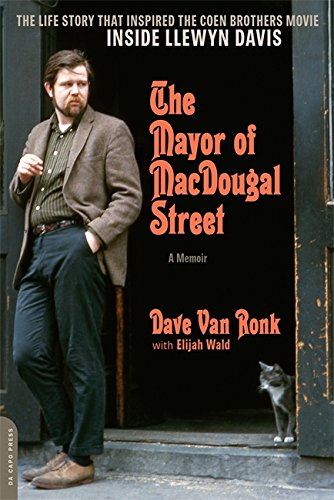
The 2013 reprint of Dave Van Ronk’s (1936 -2002) autobiography The Mayor of MacDougal Street (2004) has a cover blurb that reads: “The Life Story that Inspired the Coen Brothers Movie Inside Llewyn Davis.” Since the Coen Brothers have been known to occasionally stretch the facts about their source materials in the past, and I have not yet had the opportunity to see Inside Llewyn Davis (2013), I can neither confirm nor deny the statement. No matter how much of it they did use though, I am looking forward to the movie, because Van Ronk’s excellent memoir describes a very unique place and time in American history.
The place is New York’s Greenwich Village, and the time is the late ‘50s and early ‘60s folk music boom. Van Ronk calls it the “Great Folk Scare,” and it was fairly big deal, at least until The Beatles came along. One unfortunate fact is that this is not the book Van Ronk intended to write. He and co-author Elijah Wald had spent a fair amount of time talking about his life, but that was to be but one aspect of the story. Unfortunately, Van Ronk was diagnosed with cancer and passed away in 2002. All Wald had were those interviews, so he used them to construct a basic autobiography rather than the all-encompassing narrative about the scene that Van Ronk wanted.
Although Van Ronk’s full vision would never come about, there are plenty of glimpses into what he had in mind here. What makes The Mayor of MacDougal Street so interesting are his insights into the political Left of the era. Not so much during the Kennedy years, but in the ‘50s, when being a Democrat could practically get you blacklisted. He fills in the dots between what was going on in leftie circles between FDR and JFK, and it is a story I had never heard a first-hand account of before.
People like Woody Guthrie did not lose their faith in the Progressive movement during World War II and the Joe McCarthy years, but it was hard. Van Ronk really gets down to brass tacks too, in describing how difficult it was to find groups who were non-Communist Americans that believed in those Progressive ideals. I am hoping that the Coens found this as interesting as I did, and used at least part of it in their film.
At heart this is the story of a musician though, and they could have just as well written a movie about a young man hanging out in the Greenwich Village clubs with his acoustic guitar. This is obviously a major focus of the book too. Van Ronk describes meeting “Bobby” (Dylan) in the early days, and other fairly famous names, such as Peter, Paul and Mary. If Van Ronk had lived longer, I think there would have been less name-dropping, but it is hard to say. There are some very good stories regardless.
Wald says that no matter what, the main portion of the book would have ended in the late ‘60s, as it does. If I had not read the Afterward, I never would have known that The Mayor of MacDougal Street was only partially finished. Wald shaped what he had into a coherent narrative, and it is obvious that he did his best to introduce us to the “real” Dave Van Ronk.
While he never became as famous as many of his contemporaries did, there is no sense of regret. Van Ronk actually describes a couple of instances where he was offered the chance to get on the bandwagon, and even half-heartedly tried, but it just was not for him. All of this rings very true, and it appears that the man was not at all bitter. In fact, he seems very sad in recalling friends such as Phil Ochs, who got so depressed that he eventually committed suicide.
As The Mayor of MacDougal Street shows, Van Ronk’s happiness was in recalling a place that was almost communal in spirit. His love of other forms of music such as the blues, jazz, and bluegrass comes through loud and clear as well. The Coen Brothers name is enough for me to see Inside Llewyn Davis, as I have never been disappointed by them, and it will be interesting to see what elements (if any) of this book they utilized. But in the end, I am very happy I read Van Ronk’s memoirs, as he lived a grand life on his own terms.